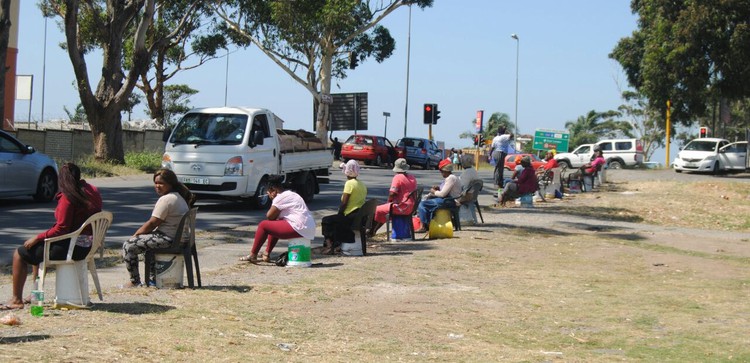
6 May 2022
Women wait by the road hoping for work, in East London. Archive photo: Thembela Ntongana
More than 80% of unemployed young people in South Africa have to choose between looking for work and buying food. This is according to a study conducted by advocacy campaign Youth Capital and Open Dialogue on the costs of job-seeking.
“This is an alarming statistic,” said Kristal Duncan-Williams, the project leader, during a virtual launch of the report, co-hosted by the DG Murray Trust, on Thursday.
The results are based on a survey of 2,200 respondents aged between 18 and 34, most of whom were looking for work at the time. Between August and November 2021 they were asked about how much they spend on data and transport looking for work, and where they get the money to look for work.
Asked if they have to choose between looking for work and buying food, 84% of participants answered “Yes”.
The study was built on the findings of the 2019 Siyakha Youth Assets Study, of youth unemployment. The Siyakha study found that young South Africans, on average, spend R938 a month looking for work. These costs include transport, data or internet usage, printing, certification, copying, postage, scanning, as well as application fees or agency fees.
With regard to finding money to look for work, most participants - 69% - said they borrow money from family members. A further 20% said they borrowed from a friend, and 27% said they used a government grant.
The survey found that 44% of respondents had been looking for a job for more than a year.
Duncan-Williams said although applications are accessible online, young people still have to travel to get their documents certified. “There’s still a requirement to send certified copies of their documents which means they’ll have to take a trip to the police station or post office, which costs money.”
The researchers said young people needed better services in their communities that lower the cost of job-seeking, such as the use of public libraries and other sites to do online applications. They said young people were often not aware of the range of services designed to connect them with what they needed.
Organisations involved in skills training should be better equipped to connect young people to employment opportunities and to ways to stay engaged in activities that strengthen their CVs, such as volunteering and job shadowing. Youth employment programmes should ensure a good fit between young people and potential employers, and equip young people with transferable skills, they said.
According to StatsSA, nearly two thirds of people aged between 15 and 24 are unemployed.
“It’s critical that solutions to address the job-seeking costs go beyond only the financial costs, and build on existing interventions to remove the roadblocks that young people face on their journey to a sustainable livelihood,” the researchers said.”